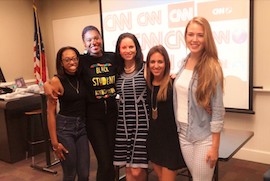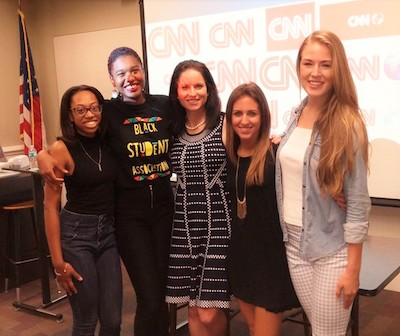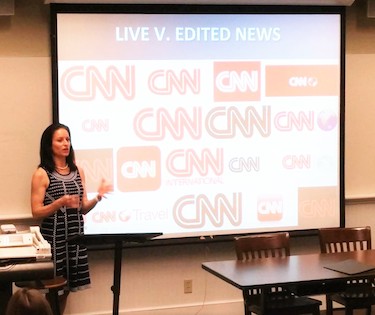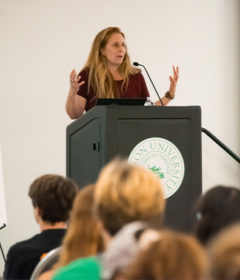Being Newsworthy


CNN Producer Alexis Weed gives Stetson media students a glimpse into the fast-paced world of journalism.
There is a special glamour to broadcast news. The poise of the anchors, the polish of the script and the unceasing drama. Whether or not we like what we hear from our televisions, united we watch—transfixed by the magic of media.
However, when Stetson University students attended a special guest lecture by an accomplished broadcast journalist and producer, they quickly learned that the behind-the-scenes work of television is less magic and more madness. The lecture was coordinated by Stetson’s Department of Communication and Media Studies.
“It’s like cramming for final exams every day,” said Alexis Weed, on-air reporter and currently, producer at CNN. “Doesn’t that sound fun?”
Every Monday through Friday, Weed and her team produce two consecutive hours of live news each day from 9 to 11 a.m., hosted by Carol Costello. Being that most teams are responsible for just one hour, the workload is heavy and begins early.
“I have the luxury of coming into work at 5 a.m.,” said Weed. The work is rapid, unrelenting, and important. “It means you must read your emails constantly,” she said.
After all, as former TIME editor Thomas Griffith noted, journalism is in fact history on the run.

But how is good journalism produced? Moreover, who decides what is newsworthy?
At CNN, these vital questions are answered through a meeting known as the editorial process.
“It’s a bit of a tug-of-war,” said Weed. “Everyone has their own opinions of what they think Americans should hear.”
These editorial meetings find balance between individual perspectives with management expectations, working though clashes to create national headlines.
“We all have our individual battles about what’s the most newsworthy,” said Weed. “It’s good that we don’t all think the same way. The more diverse a news organization can be, the better the result.”
Providing information through broadcasting news is a public service. Reporters are not television entertainers, they are investigators.
“Any reporter worth his/her salt cares very deeply about getting a story right,” said Weed. “You want to be your own devil’s advocate.”
Weed works with some of the most talented and resourceful correspondents in the nation, however in the midst of immediate crisis when there are no reporters on the ground, social media becomes an important means of breaking news.
“When I want to know what’s going on, I don’t go to my colleagues,” said Weed. “I go to Twitter.”
Weed has not had a television in seven years. Albeit she is surrounded by television every day, TV broadcasts are no longer the primary source of information.
“News is constantly changing,” said Weed.
Working with CNN for eight years—seven as a legal producer and reporter for HLN—Weed does not fear change. In fact, her career path is rooted in it.
Experienced and talented, Weed has covered stories such as the Baltimore riots, the Pontifical visit to the U.S., the Sandy Hook shooting and other national headline news stories. It is difficult to imagine her working anywhere else but in the media.
However, when Weed graduated from Michigan State University as a political science major, she intended to become a lawyer, and, upon graduating Loyola University Chicago School of Law, spent five years as an attorney in products litigation.
“It was interesting work,” said Weed. “But I learned more about gaskets and steam generators than I ever wanted to know.”
The work became routine, and Weed decided it was time for a change—a change that brought her to Northwestern for her master’s in journalism, and eventually to CNN. Still, shifting her entire career path was not a seamless transition.
“I felt that it would be irresponsible for me to do this,” said Weed. “I’d be giving up certainty. I was fearful that I wouldn’t be able to keep a roof over my head or pay my student loans.”
It was her mother, a pioneer for women’s professional skiing, who encouraged Weed to take the risk.
“She always gave me a lot of belief in myself that it would all be okay if I just dug in and worked hard.”
No matter our individual career pursuits, Weed reminded us that we should never compromise our ambitions for complacency.
“I urge you to keep digging, keep searching for answers,” said Weed. And, if you’re watching CNN, she advised, “Do not turn off your television.”
For news updates and further information, follow @alexiskweed via Twitter.
by Veronica Faison



